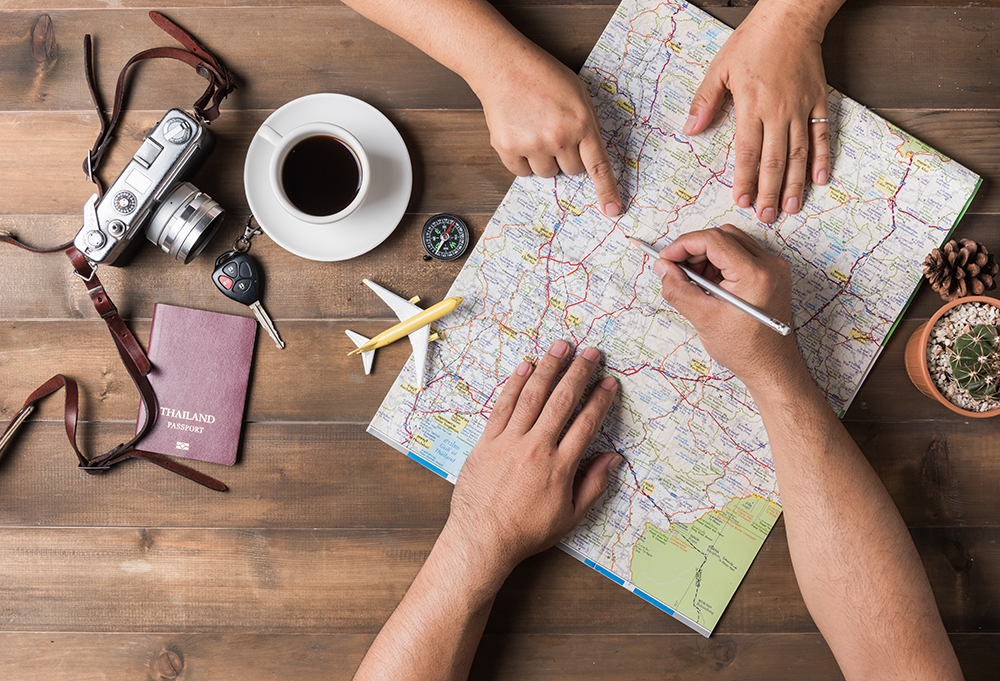Planning a trip, whether it’s a solo adventure, a romantic getaway with your partner, or a vacation with family and friends, involves thorough advance planning. To enhance your experience and overall enjoyment, substantial resources—both financial and strategic—are essential. The more information you can gather in advance, the better we can create a top-notch itinerary that matches your goals, expectations, and budget. We’re here to share our extensive experience to help you achieve flawless trip planning!
1. Clarify the goals of the trip:
What are your key trip objectives? Are you looking for a cultural experience, a historical adventure, a relaxing getaway, or a combination of these experiences? Defining your needs early on will help shape an ideal itinerary.
2. Select travel dates wisely:
Identify the optimal time to visit your planned destinations by considering factors such as weather, events, and local holidays. Keep an eye on peak seasons, as they can significantly impact costs, availability, and accessibility.

3. Define your budget:
Create a comprehensive budget that covers all aspects of your trip, including flights, accommodation, meals, transportation, activities, souvenirs, and an extra allowance for unexpected expenses. This will ensure financial peace of mind throughout your journey.
4. Choose relevant destinations:
Thoroughly research and carefully select destinations that align with your interests and suit your budget. Try to create a well-planned combination for a varied and enriching travel experience.
5. Check visa and documentation requirements:
Check the visa requirements for each country on your travel itinerary and initiate the application process well in advance. Confirm that your passport is valid for at least six months beyond your last scheduled entry date and has sufficient blank pages for border control stamps. Keep printed copies of essential documents such as passports, vouchers, and travel insurance policies.
6. Book flights, shuttles, and rental cars:
Start your flight search well in advance to ensure availability and favorable rates. Use websites that compare ticket prices. The more flexible you are with your travel dates, the more likely you’ll find the most budget-friendly deals.
7. Arrange lodging:
Explore convenient options based on location and prices. If you plan to rent a car, be sure to check parking facilities and rates, as well.
8. Create a detailed itinerary:
Use digital tables like Excel to develop a thorough daily plan, including activities, attractions, accommodation, meals, and transportation. While flexibility is key, a well-structured plan will help you maximize your available time.
9. Packing essential items:
Make a detailed packing list that includes suitable clothing for diverse climates and a range of activities. Include essentials like comfortable shoes, toiletries, chargers, cables, adapters, power strips, and any specialized equipment you may need. Remember to bring adapters for different types of socket types and various electrical standards.
10. Secure travel insurance:
Choose a comprehensive travel insurance plan that covers emergency medical situations, trip cancellations, lost luggage, accidents involving rented cars, and unforeseen expenses. Review the coverage and terms of the policies to ensure thorough protection.
11. Learn basic local phrases:
Familiarize yourself with a few key phrases in the local languages of the countries you plan to visit. This can enhance your travel experience and facilitate communication with locals.
12. Arrange transportation:
If your itinerary includes road trips, compare car rental agencies and book in advance. Take into account fuel expenses, estimating costs based on expected distances and fuel prices in each country. Include additional expenses like tolls, ferry fees, and parking fees.
13. Budget for attractions:
As part of your planning, check entrance fees to attractions. Be mindful of available discounts for students, seniors, or children, and inquire about the necessary identification in advance. Also, explore options for discounted entry to attractions that provide access to multiple sites or offer combo tickets.

14. Prepare financially:
Verify your credit card limits and bear in mind that rental companies may occasionally place a temporary hold on a certain amount on your credit card until the completion of the transaction.
15. Plan ahead for your health:
Consult with your healthcare provider regarding vaccinations and health recommendations tailored to your travel destinations. Be sure to have your medications and prescriptions on hand.
16. Stay connected online:
Purchase local SIM cards or international communication packages that cover the countries you’ll be visiting. Make sure the packages include features like map browsing and internet services.
17. Notify emergency contacts:
Share your itinerary with family and friends, compile a list of emergency numbers for each country you plan to visit, and establish a plan for emergencies.
18. Take safety precautions:
Keep updated about relevant travel alerts for your intended destinations. Stay vigilant and ensure the safety of your personal belongings. Opt for bags or pouches that enable secure storage of documents, money, and jewelry. Given the prevalence of pickpockets, it’s advisable to refrain from wearing valuable jewelry and to keep wallets and cell phones in front pockets. When available, make use of safes in your accommodation.

19. Stay organized:
Keep all travel documents, reservations, and important information in a secure place, either in a physical folder or a digital app. Ensure that you have copies of the car rental agreement, insurance policies, medical prescription, and local and international driving licenses.
20. Be open and flexible:
Embrace new cultures, engage people from different backgrounds, and be open to unexpected experiences. Flexibility can lead to unforgettable adventures.
21. Try the local cuisine:
Allocate part of your budget for dining out and indulge in local cuisine and drinks at each destination. Exploring culinary culture is an integral part of traveling in Europe.
22. Embrace local customs:
Take the time to familiarize yourself with the cultural norms and etiquettes of the countries on your itinerary. Embracing the local culture and adopting a respectful attitude will enhance your interaction with locals and contribute to a more meaningful travel experience.
23. Document your journey:
Keeping a travel journal is a great way to capture the experiences, thoughts, and meaningful memories of your trip.
24. Financial cushion:
It is recommended to set aside a reserve fund, approximately 20% of the planned budget, to cover unforeseen expenses.
25. Wishing you safe and enjoyable travels!

















